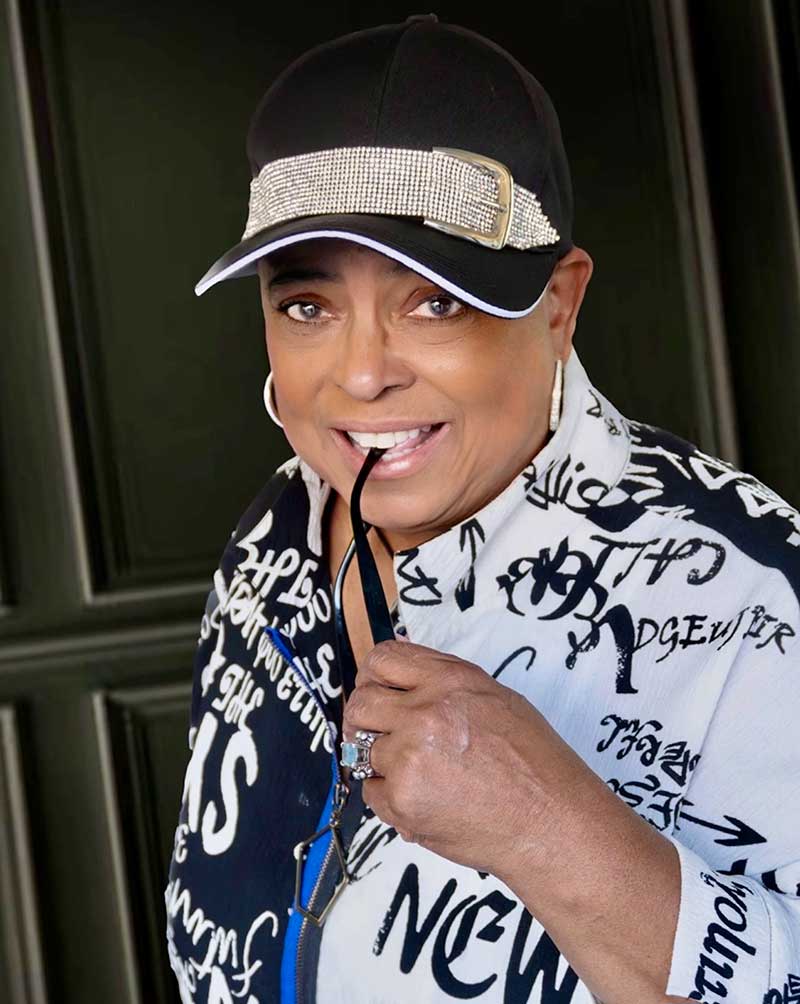
Photo of L.A. Walker by Amanda Carter/Jaia Photography
L.A. Walker Uses Creativity to Share Her Message
Social Issues Theatre Brings Society Together One Line at a Time
By Debbie Hall
In a darkened theater, audience members are immersed in “The Wonderful World of Was,” a musical dramedy presented by the nonprofit Social Issues Theatre, about a man diagnosed with Alzheimer’s who loses his wife and caregiver. His care falls to his self-centered daughter, personal assistant, long-time friend and maintenance man, all of whom have no prior experience in dementia care.
“The Wonderful World of Was” features music and humor that makes the information palatable and opens up conversations—an experience that L.A. Walker (author, playwright, songwriter, podcaster and co-executive director of Social Issues Theatre, along with Marcia Norris) understands. Through Social Issues Theatre, Walker uses her skills to help advance dementia and caregiver awareness.
Dementia is a general term that describes symptoms that affect cognitive abilities, memory, thinking and behavior. It’s not a specific disease but an umbrella term for a group of symptoms. Alzheimer’s is the most common cause or type of dementia, accounting for the majority of cases, but there are many diseases with symptoms, including Lewy body dementia.
Walker’s wife, Terry, died from Lewy body dementia in June 2020 during the pandemic. “After she passed, I spent a lot of time with myself and looked back at some of the episodes I encountered,” says Walker.
Walker says that the point of “The Wonderful World of Was” was to keep the story about dementia light. “It tells the story of a chosen family who bands together and assumes the responsibility of caring for a guy who’s been in their lives as a friend, a father figure, a neighbor and an actual father because he did have a daughter. His wife passed in the process of giving care,” says Walker. “There are an estimated seven million people in the United States who have dementia or dementia-related conditions. Marcia’s mother is presently in a dementia decline and the music director’s mother has dementia.”
Health issues, racism, homophobia and gender bias are among the subjects covered by the plays written, produced and performed by the Social Issues Theatre. Walker is inspired by the ability of the arts to confront societal concerns in a revolutionary way. “Writing a play that inspires hope and a sense of possibility in the audience, rather than just for laughs or entertainment, motivates me,” adds Walker.
“Together, we wrote songs for the production that would be uplifting. We tried not to make them sad but relative to the subject matter. Also, as a relief, we take the pressure off of the conversation for the audience. Because people kept asking questions, we created a service, not just a play. That’s when we put our heads together and devised Enable Me Theatre, a pilot program we’re working on now.”
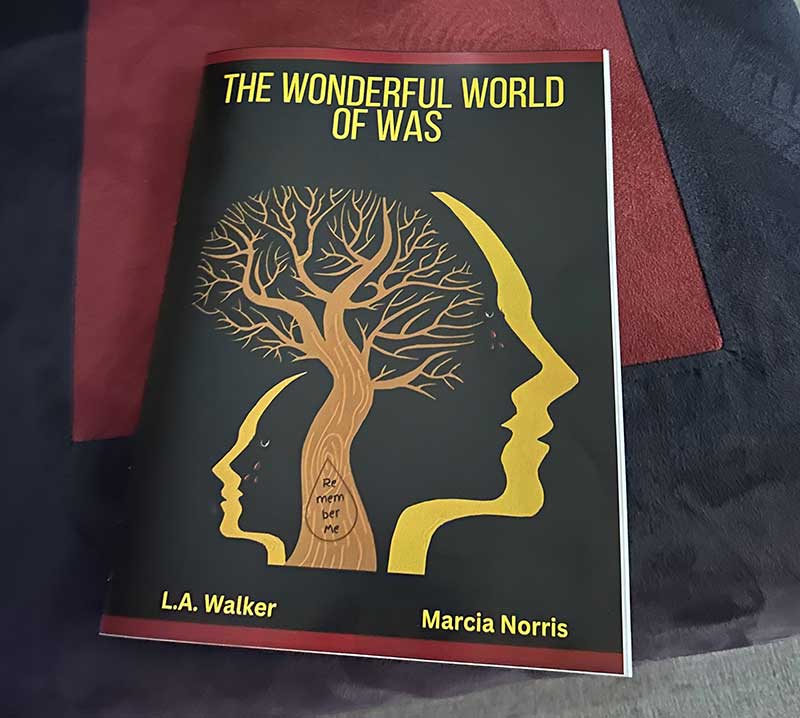
Program for the play “The Wonderful World of Was.” Photo courtesy of L.A. Walker
Walker hosts her motivational podcast, “Up is Higher Than Down,” where she seizes opportunities to have guests share their dementia journey. The podcast is available on all podcast platforms. “Years ago, my wife and I had a brief program on WEBB in Chicago with the same title. I didn’t think about it until COVID-19, her death and all of that came about. I realized that it would be essential for me to latch on to anything positive and help others hold on with all our might to get through what we went through because that was an ordeal. I was very fortunate,” says Walker.
She has interviewed Steph Payne (Las Vegas entertainer), Tamechi Briggs (who created the “Hammer pants” and made all of the outfits for “Soul Train”), Coco Montrese (drag performer) and Ron L. Haynes (from “Ma Rainey’s Black Bottom”). Other guests included Marcell Ateman (UFL football wide receiver), David Raibon (comedian), Skip Martin (former lead singer for Kool & The Gang), Morris Hayes (Prince’s musical director), Ariann Black (magician) and most recently Michael Peterson (Grammy-nominated country star).

“Up is Higher Than Down with L.A. Walker” podcast. Photo courtesy of L.A. Walker
“We often think when we talk in terms of motivation that the person hosting will say everything’s right, good and bright, and all you have to do is fill in the blanks. That’s so unrealistic, untrue and disturbing. We have challenges, and sometimes life is like a puzzle. Sometimes, we drop the pieces and don’t know how to put them all back together. But if we can pick up that one piece, that’s where we start,” Walker stated.
Another aspect of her outreach is collaborating with Dr. Jason Flatt, an associate professor specializing in social and behavioral health from the University of Nevada, Las Vegas (UNLV) School of Public Health. He’ll work with Enable Me Theatre’s pilot program. With his profound expertise in LGBTQ health, gerontology, Alzheimer’s, and caregiving, he’ll be pivotal in guiding the program’s development and providing invaluable insights.
Jay Nagle, a distinguished director and teaching artist from The Smith Center’s Education and Outreach Department, is heading the creative direction. With certifications from the Cleveland Clinic and Southern Nevada State Veterans Home in TimeSlips, Nagle will guide dementia caregivers as they script and perform their emotional narratives in a poignant final stage production.
International recording artist Patrice Isley will add a melodic touch to the initiative. Renowned for her Confident Performer Workshop Series in partnership with UNLV, Isley will serve as the music coach, harnessing the therapeutic power of music to alleviate stress and elevate moods among dementia caregivers. Isley and Nagle will assist caregivers in transferring their experience into mini songs to be infused into their final production. Amanda Carter of Jaia Photography, the program’s dedicated photo documentarian, will capture the essence of this transformative journey, ensuring that every moment and emotion is preserved and shared. Together, this interdisciplinary team is pioneering new avenues for social impact through the arts, empowering caregivers and reshaping the narrative around dementia care.
After being interviewed for a San Francisco Bay Times article about her life and works, The Outwords Archive sought Walker out to interview her for an on-camera oral history project, which became the first-ever national project devoted exclusively to recording the stories of older LGBTQIA2S+ nationwide.

Photo of Dr. Jason Flatt by Becca Schwartz/University of Nevada, Las Vegas
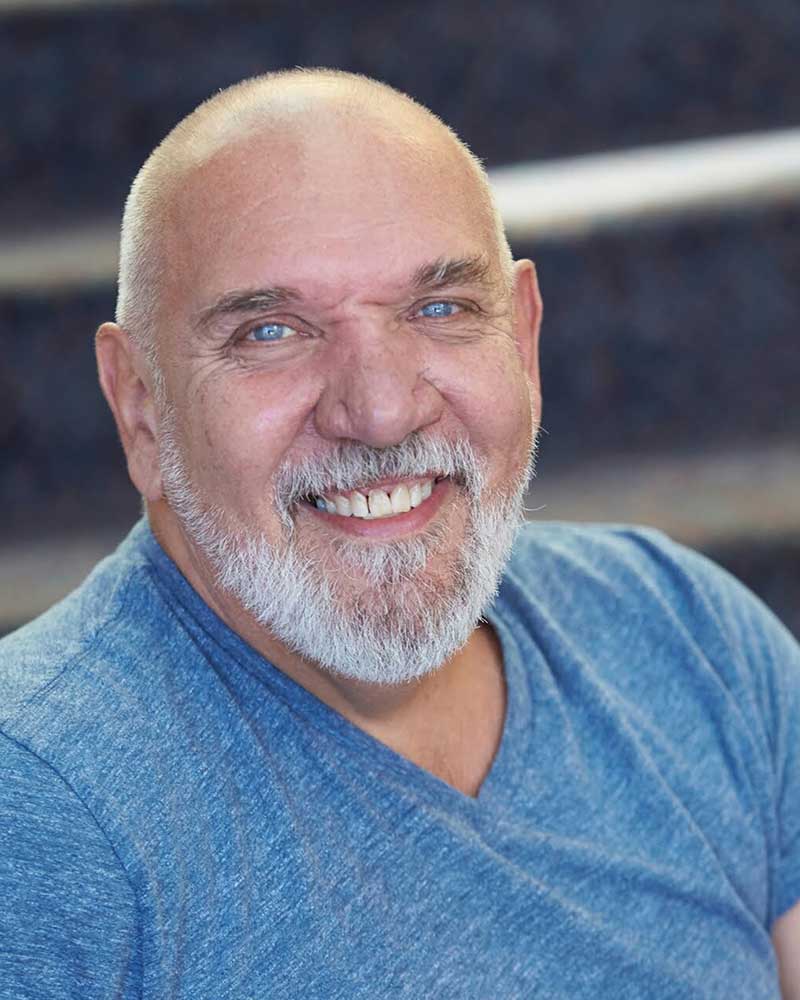
Photo of Jay Nagle by Geri Kodey
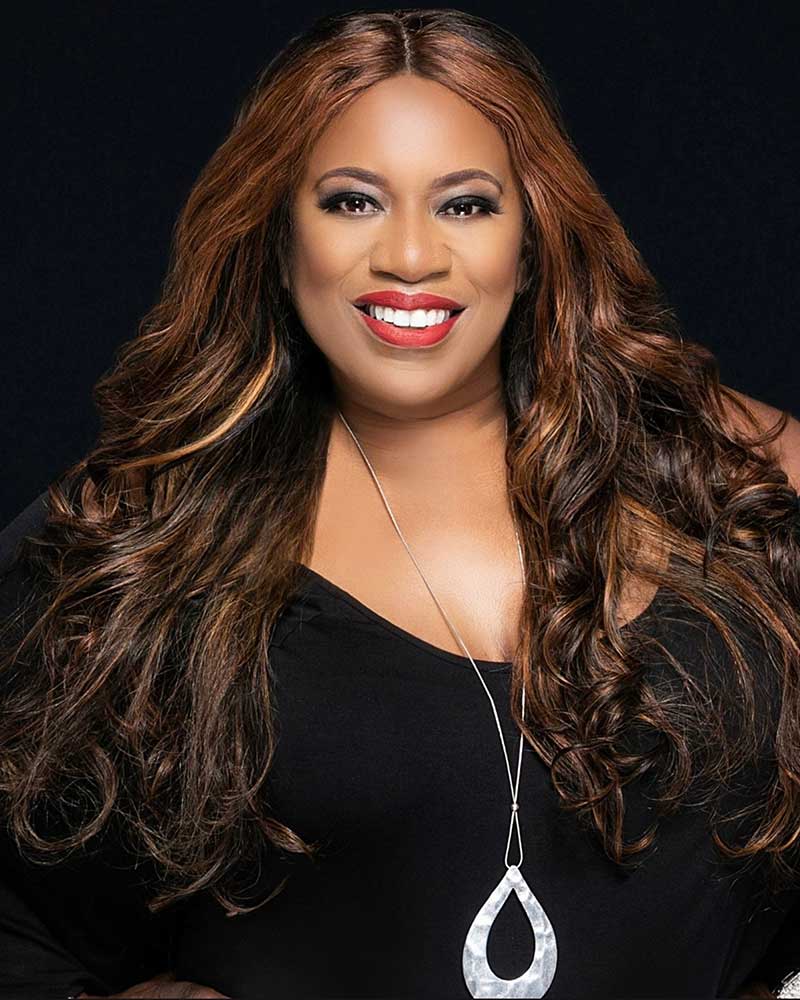
Photo of Patrice Isley courtesy of L.A. Walker
Before creating Social Issues Theatre, including Enable Me Theatre and the Up is Higher Than Down podcast, Walker lived an entirely different life. The native Chicagoan was raised on the south side of Chicago in a family of ministers and dedicated her life to community efforts. She joined the military in May 1976 and attended the Defense Information School (DINFOS) for television and radio broadcasting, where she learned film production, directing and switching, and later spent time in Panama as a television news anchor. After leaving the service, Walker worked as a news director in Baltimore. After the passing of her mother, she transitioned to selling luxury automobiles.
Walker met her wife 33 years ago and wrote her first play in 1994. “I was responsible for the ministry for some young people from foster homes without guidance on living, working together, or building their self-esteem. I wrote a play entitled “A Serpent in the Garden” so that each of them would have a character so they could see themselves, if not during that time later in life, they could put it together.”
Walker and her partner moved to Las Vegas in 2003 because Terry wanted to move to Southern Nevada. They were operating two boutique furniture stores in the Midwest, but with the stock market and 9-11, they decided the struggle was too much to continue.
“When we could get married, I proposed to her during my first stage play, “Six No Uptown,” at the Clark County Library Theater, inspired by the late great artist Annie Lee. They would marry later, and as Walker stated, “Our whole time together was just romantic; it was a romantic time.”

Terry and L.A. Walker share a tender moment. Photo by Nelson Ramirez
While working as a luxury home realtor, Walker noticed something was happening with her wife. Terry could no longer execute a phone call and make appointments. “I wrote the play “The Mam Show,” where Terry portrays Louis Armstrong’s wife, speaking two lines. She couldn’t remember her lines and changed them every single time. Fortunately, the actor who played Louis Armstrong was a professional. The audience never knew the lines changed. Then Terry told me she knew she was losing her memory because she was buying me something for Christmas but forgot to bring her credit card. I said, ‘Well, girl, you know you lost your memory if you didn’t have your credit card.’ So we laughed, but nothing was funny,” remembered Walker.
They tried to get past it, but it became a solemn and surreal moment when they found out that the mother of a dear friend also had dementia. “We all cried. It was like, you know, tears from way down deep. But even with that acknowledgment, it took me a minute. It’s never easy for someone to admit they have dementia. The care partner, who could be a spouse, sibling or a close friend, also finds it difficult to accept that the person with it exists. Therefore, a lot of time is lost in denial by refusing to accept it. We acknowledged her dementia in 2014.”
In 2017, she underwent cognitive testing, and the results showed that she had cognitive impairment. They didn’t diagnose it as Lewy body dementia until the following year. “It was all over, but it’s never over for those of us who’ve lost a loved one to dementia. It’s never over for us,” says Walker. “One of the things that’s very important to stress is that caregivers and care partners really go through it while the patient is living, and they go through it afterward.”
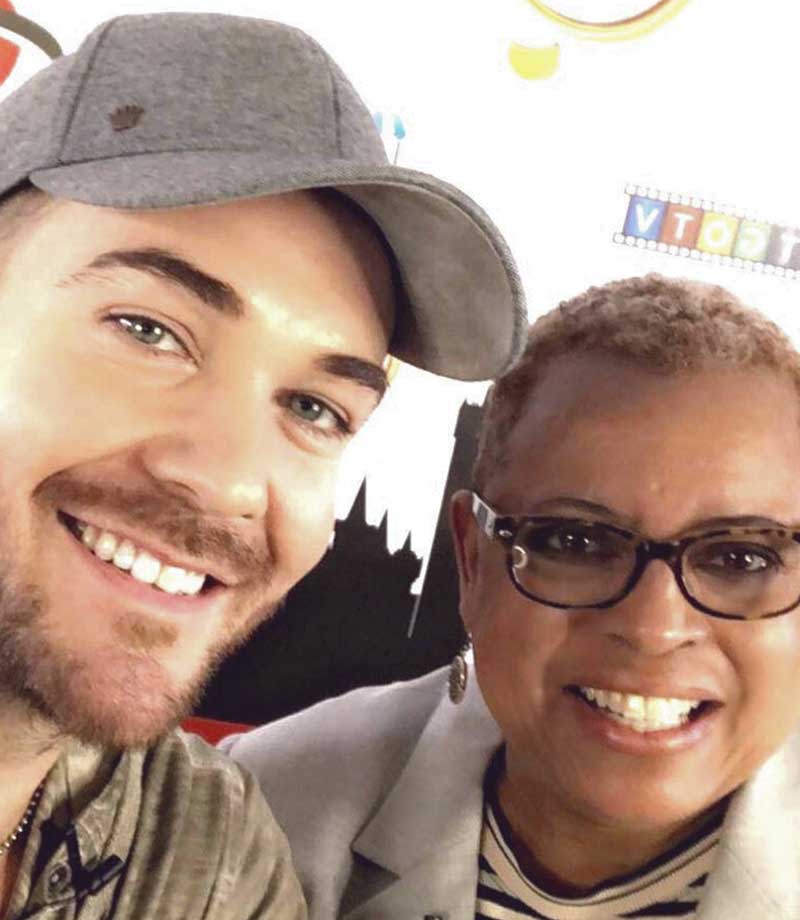
Performer Chase Brown, posing with L.A. Walker, sings “I’m a Man Who Loves a Man,” an anthem shining the light on the road to self-acceptance. Photo by TGo Network
Another one of Walker’s plays, “No Labels,” is about a homophobic dog that gets adopted by a gay couple and freaks out, so the entire family seeks therapy. Performer Chase Brown sings “I’m a Man Who Loves a Man” from the play, an anthem shining the light on the road to self-acceptance. The song, written by Walker and arranged by Joey Melotti, was recently presented and well received during The Composers Showcase of Las Vegas at Myron’s at The Smith Center.
Walker also appeared in the film “Move Me No Mountain,” written and directed by Deborah Richards, portraying herself during a therapy session, revealing how guilty she felt moving forward with her life after the passing of her spouse. The movie, streaming on Tubi, centers around real estate agent Jenna Anderson crippled by guilt from the violent and sudden death of her daughter. With nothing to lose, she walks away from society to live on the streets in Las Vegas.
As Walker explained, dementia has become so stigmatized and people don’t want to talk about it. “If someone in your family has it, it’s like a mark. People don’t want to get into it. First, we want to do everything possible to destigmatize, normalize and make it a conversation because so many people have it. Dementia is a silent health crisis that begs for our immediate attention.
Walker is available for speaking engagements. For more information, visit www.thesit.org or follow @socialissuestheatre and @upishigherthandown on Facebook.



So good. She is a remarkable person. Wow.
Amazing article, an amazing program, an amazing woman! I am honored to work this program which is very close to my heart!
L.A.! Wow, what a life you lived! I enjoyed learning more about you in reading this publication. It was such a great experience working with you and I’m here for you should you need anything. All the best…Joey